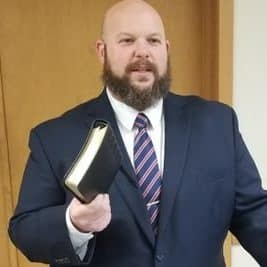Few issues draw more attention in the modern day than the issue of pastors versus secular counselors. It only takes a single tweet suggesting that pastors are indeed equipped to counsel believers to light a fire throughout the world of social media.
Before you can blink, the accusations come railing in championing the secular world of counseling and demonstrating little understanding of the role of the pastor. However, there is a genuine question in the mix: is the pastor equipped to counsel people? The short answer is yes. That’s part of the pastor’s job description. The pastor is told that he must “shepherd the flock of God among you” (1 Peter 5:2), and Paul tells Timothy to “preach the word; be ready in season and out of season; correct, rebuke, and exhort, with great patience and instruction” (2 Timothy 4:2).
Correcting, rebuking, and exhorting with patience and instruction sounds a lot like counseling people in godliness, doesn’t it? It’s hard to miss this if one takes the time to consider what is involved in Paul’s instructions to Timothy. But, of course, the question arises as to why this is so confusing since the Scriptures are clear.
I believe a great deal of confusion comes from the modern use of the term “mental illness,” and this is where we get into trouble. The immediate assumption from many is that if the word “mental illness” is used, it must be outside the pastor’s realm. The irony is that secular counseling has nothing to do with surgeries, true medical needs, or even prescription medications.
For the record, I am not speaking of the necessity for true medical health care. If one has diabetes, a broken leg, or even a headache, by all means, see the doctor or take the appropriate medication. But we are talking of counseling, giving direction and guidance to deal with life’s difficulties.
Part of the issue is that the accusation of “pastors aren’t equipped to deal with mental health issues” is a multifaceted accusation rooted ultimately in biblical ignorance, a poor worldview, ignorance of the field, and ultimately idolatry.
Biblical Ignorance
I mention biblical ignorance is part of the issue because the Bible is sufficient and, in its sufficiency, addresses every core issue that would require counseling. Beyond that, the undershepherd is, by definition, a counselor. He brings the Word of God to bear on every aspect of the Christian life: how we are to act, think, and speak. The pastor counsels from the pulpit to the classroom to one-on-one sessions.
Furthermore, biblical ignorance is demonstrated when people say, “show me where the Bible mentions manic depression.” Just like I can’t show you the word “Trinity” in Scripture, which is surely taught and made evident, so it is often the same with “mental issues.” For example, Philippians 4:6–7 says, “Do not be anxious about anything, but in every situation, by prayer and petition, with thanksgiving, present your requests to God. And the peace of God, which transcends all understanding, will guard your hearts and your minds in Christ Jesus.” This verse gives us a command and the remedy for anxiousness. First, we are told not to be anxious. Then we are told that instead, we are to develop a posture of prayer and thankfulness, and the result is that dependency upon the Lord and a heart of thankfulness will cause the peace of God to guard our hearts and minds. “Anxiousness” isn’t a mental disease; it’s a mindset contrary to that of Scripture and requires renewing the mind through obedience to Scripture and trust in God.
Poor Worldview
Insistence upon secular counseling is a poor worldview because it ultimately views the secular, godless, and God-hating world as being far more understanding of the human condition than God, the one who created man. It also assumes that a system that either (a) is wholly based upon the presupposition that God doesn’t even exist or (b) hates God, therefore intentionally removing “spirituality” from man, is somehow more rooted in the “truth” of how man works than Scripture, which is born from God, the very source of truth. In essence, the worldview of modern counseling is that man is greater or equal to God.
For instance, Alfred Adler referred to religion as “fiction.” Sigmund Freud, in his book New Introductory Lectures on Psychoanalysis, wrote that “religion is an illusion and it derives its strength from readiness to fit in with our instinctual wishful impulses.” Carl Jung believed that God was nothing more than an aspect of the human psyche, and B.F. Skinner says, “I don’t believe in God, so I’m not afraid of dying.”
The reality is that these men are the foundation for secular counseling, and the question that needs to be asked is, “Why does any Christian reject God’s Word in favor of counsel from those who hate God?”
Ignorance of the Field
Most people seem to believe that counseling/psychiatry is a fixed, proven system with absolute knowledge of how to treat various mental illness that are as diagnosable as cancer. This is erroneous, failing to acknowledge that this area of “medicine” is still experimental (i.e., “we’ll try this med; if it doesn’t work, we’ll try that medication,” ad Infinitum).
In addition, most fail to realize that the goal in secular counseling is never to find the root issue, but rather merely to treat the symptom. The Diagnostic and Statistical Manual of Mental Disorders is about symptoms, not causes. People also turn a blind eye to the various horrors of medication side effects: addictions, long-term permanent damage, and dependency, to name a few. Rather than helping, many medications simply decrease brain function, to which many cheer, “You’re cured.” But the Psalmist didn’t seek a concoction to numb the mind. Rather, he recognized that “Even though I walk through the valley of the shadow of death, I fear no evil, for You are with me; Your rod and Your staff, they comfort me” (Psalm 23:4).
In secular counseling, ignorance is perhaps even worse because it also must involve a conscience decision to abandon logic and reason. Why would you take advice from a system that hates God and is opinion-based, rooted in observations that reject the spiritual nature of the human being over God’s Word, rooted and grounded in absolute truth from the one who created man?
It should be a huge red flag for the Christian to consider going to someone who believes there is no God, no morals, and no absolute truths with the request, “Can you give me the truth on how to resolve my issue?”
The believer should first be going to the ones who shepherd them from the highest counsel, God’s counsel. This is what pastors are trained for; this is their God-ordained role. God never intended the godless to shepherd His people. Consider the type of person the secular world can provide. At its best, secular counselors are defined in Ephesians chapter two as one who is dead in their trespasses and sins. It goes on to say that those without Christ are living according to the lusts of the flesh and the desires of the flesh and the mind, following after the prince of the power of the air, and that they are by nature children of Wrath (Ephesians 2:1–3). This is what Christians subjects themselves to when they go to secular counseling.
If that weren’t enough, in Ephesians 4:17–19 we read, “So this I say, and affirm together with the Lord, that you walk no longer just as the Gentiles also walk, in the futility of their mind, being darkened in their understanding, excluded from the life of God because of the ignorance that is in them, because of the hardness of their heart; and they, having become callous, have given themselves over to sensuality for the practice of every kind of impurity with greediness.”
Counseling from God’s Word is counseling from the light, while counseling from the world is, by necessity, counseling born of darkened minds. There should be no option for the Christian—run to the light.
Idolatry
I mention idolatry for several reasons. One is that medications have become an idol that many bow down to as the supreme “fix,” instead of dealing with real-life issues, addressing sinful habits and ways of thinking, and seeking God’s wisdom. Instead of worshiping God in seeking His counsel, our age has made a golden calf of medication.
It is clear that a great deal of “mental issues” come from sin, though not all (consider Job), and rather than deal with the need for repentance, it has become easier to take a pill and effectively remain your own God.
Not only have medications or quick fixes become idols, feelings have also become idols. Many people believe they should never feel remorse, sadness, suffering, etc. “Joel Osteen Christianity” is the desired mentality: healthy, wealthy, prosperous—always smiling. Feelings drive our current culture. One doesn’t have to listen long before hearing something like “if it feels good to you, do it.”
As Christians we are not to be ruled by our feelings, but by truth. One way the idolatry of feelings occurs is when we attempt to simply do away with difficult emotions that would otherwise drive us to Christ and demonstrate our dependence upon Him. Job didn’t ignore his pain and sorrow but worshiped God through it. Concerning sorrow, Charles Spurgeon writes, “I would sooner be holy than happy if the two things could be divorced. Were it possible for a man always to sorrow and yet to be pure; I would choose the sorrow if I might win the purity, for to be free from the power of sin, to be made to love holiness, is true happiness.”
In conclusion, we are told there will be difficulties, troubles, and trials in this world. Jesus says to the disciples in John 16:33, “These things I have spoken to you, so that in Me you may have peace. In the world, you have tribulation, but take courage; I have overcome the world.”
The goal of the Christian life should never be taking the easiest way out, nor should the Christian look to the world for guidance and counseling. Rather, we are to look to Christ and be satisfied and content in all things. He is our great counselor, and He has given us a book by which we may come to rightly view God, ourselves, and the world around us. He has given undershepherds to the church, and they are God’s plan for counseling His people in life and godliness.
Therefore, for Christians in need of counseling, the Bible should be the first resort, not the last, and they should seek the pastors of the church rather than the godless of the world.




